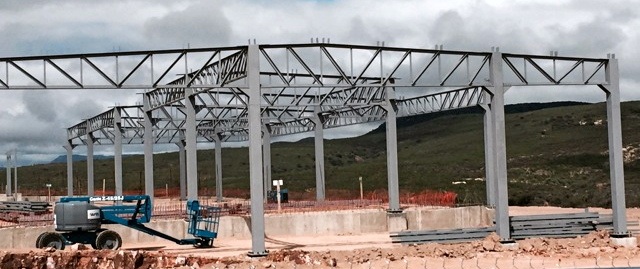Arkansas State University partnership in Mexico still on track
by October 11, 2016 5:32 pm 347 views

Structures are going up at the Arkansas State University campus in Mexico. (photo courtesy of ASU)
The first American-style campus in Mexico will open on schedule.
Arkansas State University’s former Chancellor Tim Hudson played a vital role when the university decided to partner with foreign businessmen to form the Arkansas State University Queretaro campus in Mexico nearly four years ago.
The fate of the project was uncertain after Hudson resigned in August after it was divulged he may have committed multiple ethical violations while serving as the chancellor. Communications Department Dean Dr. Brad Rawlins has been appointed to oversee the project, and he told Talk Business & Politics the campus in the Queretaro Province will open in August 2017.
“We’re moving forward … campus construction is ongoing. Hopefully, most of it will be completed in the coming months,” Rawlins said.
When asked if there were any problems associated with Hudson’s sudden departure on this particular project, Rawlins said he wasn’t aware of any. ASU will serve a unique role with the college. It will design the curriculum and hire the instructors. Classes will be taught in English, and ASU will set the standards under which the campus will be operated. The ASU brand will be used.
In return, ASU will receive what is essentially a franchise fee, Rawlins said. The fee will be about $1,600 per student, per year once the enrollment number reaches 5,000 per year, according to the agreement. ASU could enjoy a windfall of at least $8 million per year when that many or more students attend school.
Officials hope to attract 1,000 students the first year. Majors in engineering, science, technology, business and communication will initially be offered. Those class offerings will likely expand, Rawlins said. The ASU Board of Trustees will set the tuition rates at the school.
Graduates will have accredited degrees in Mexico and the United States.
The campus has been built on a 370-acre swath near the technology and industrial hub in Queretaro, a state in north-central Mexico about 200 miles from Mexico City. The project will cost about $75 million to complete and is being funded by private donations from businesses and other entities. The goal is to expand the educational offerings in Mexico, and train a more diversified workforce, according to the school.
Queretaro is one of the innovation hubs in the country and is considered one of the most business friendly states in Mexico. Hundreds of foreign businesses have operations not far from the proposed campus.
Workers have nearly completed the administration building, and work continues on classrooms, a student union, dorms and other facilities. The first phase of the campus will include more than 800,000 square feet of learning and living space, but will only consume about 86 acres of the project area.
“We will have a lot of room to expand,” Rawlins said.
ASU’s public-private partnership is unique in Mexico. Other American colleges and universities have partnership agreements with institutions in Mexico, but this is different, Rawlins said. This university is modeled after American-style universities. In Mexico, college students don’t typically live in dorms on campus. This total immersion into college life will provide a cultural shift, Rawlins said.
“The facilities and dorms will be very attractive,” he said. “It will be a whole new learning experience.”
The partnership may benefit ASU in other ways. Students and professor exchanges are almost certain to occur, and it will help foster a stronger relationship between Northeast Arkansas and Mexico Rawlins said.
Rawlins will move to Mexico to serve as the school’s provost when it opens, he said. Instructors will be hired in the coming months, and deans will be selected.
“It’s really exciting,” he said.
